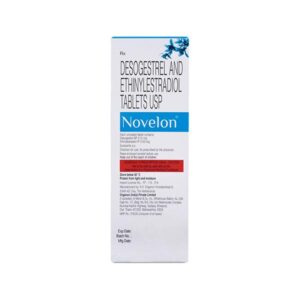ETHINYL ESTRADIOL + DESOGESTREL
Ethinyl Estradiol: Ethinyl Estradiol is a synthetic form of the hormone estrogen that is commonly used in combination with other medications as an oral contraceptive, also known as “the Pill,” to prevent pregnancy. It is also prescribed for the treatment of menopausal symptoms and certain gynecological conditions.
The mechanism of action of ethinyl estradiol is primarily through its ability to suppress the release of follicle-stimulating hormone (FSH) and luteinizing hormone (LH) from the pituitary gland. This inhibition prevents the development and release of eggs from the ovaries, thereby preventing pregnancy. Ethinyl estradiol also thickens the cervical mucus, making it more difficult for sperm to reach the uterus and fertilize an egg.
The typical dose of ethinyl estradiol in combination oral contraceptives is 20 to 35 micrograms per day. However, the exact dosage may vary depending on the specific brand and formulation of the medication. It is typically taken once daily for 21 to 28 consecutive days, followed by a break or a week of placebo pills to allow for menstruation.
As with any medication, some side effects may occur while taking ethinyl estradiol. Common side effects include breast tenderness, nausea, bloating, weight gain, mood swings, headache, and decreased sexual drive. These side effects are usually mild and transient, but if they become severe or persistent, it is advisable to consult a healthcare professional.
In rare cases, more serious side effects can occur with ethinyl estradiol use, such as blood clots, liver problems, high blood pressure, and increased risk of certain types of cancer (e.g., breast and uterine cancer). It is important to discuss any pre-existing medical conditions, such as a history of blood clots or liver disease, with a healthcare provider before starting ethinyl estradiol.
It is worth noting that ethinyl estradiol does not protect against sexually transmitted infections (STIs). Therefore, additional protection, such as the use of barrier methods like condoms, is recommended for STI prevention.
Desogestrel: Desogestrel is a synthetic progestin used primarily as an oral contraceptive or birth control pill. It is available under various brand names such as Cerazette, Apri, Azalia, and Desogen.
Desogestrel works by preventing the release of an egg from the ovary (ovulation) and making the cervical mucus thicker, which makes it harder for sperm to reach the egg and fertilize it. Additionally, it alters the lining of the uterus, making it less receptive to a fertilized egg.
The usual dose of Desogestrel is one pill taken daily, preferably at the same time each day, without any breaks between packs. It is important to follow the instructions provided by the healthcare provider or the package insert.
Some common side effects of Desogestrel may include irregular menstrual bleeding or spotting, headache, breast tenderness, nausea, acne, weight gain, mood changes, and decreased libido. These side effects are usually mild and tend to improve with time. However, if any side effects persist or worsen, it is advisable to consult a healthcare professional.
While Desogestrel is generally safe and effective, it is not suitable for everyone, and there are certain contraindications and precautions to consider. It is important to inform the healthcare provider about any existing medical conditions, allergies, or medications being taken, as they may affect the use of Desogestrel.
Additionally, it is important to note that Desogestrel does not protect against sexually transmitted infections (STIs), and another form of barrier protection, such as condoms, should be used in conjunction with the pill to prevent STIs.


